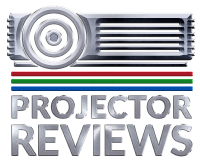Hitachi CP-D10 Video Performance
Most multimedia projectors feature only passable video performance and the CP-D10 is no exception. Video processing and black levels are a far cry from what you see on even lower-priced home theater projectors, but acceptable nonetheless.
The CP-D10 does a decent job with DVD playback. Taking a look at my old standby DVD, The Fifth Element, skin tones were decent and the picture looked reasonably sharp. However, video enjoyment is restricted mainly by its low contrast ratio, which results in a great loss of detail in shadows. That being said, the CP-D10’s video playback is more than adequate for its intended use in classrooms and boardrooms.
Hitachi CP-D10 Brightness
The CP-D10 is rated at 2000 lumens. With the projector as close as it is to the screen and with the upward projection angle, measuring the output was somewhat difficult. Just the slightest rotation of the meter toward or away from the projector changed the results drastically and pointing the meter directly at the projector resulted in abnormally high results. Measurements were ultimately taken with the meter in a few different positions and averaging the results. In Daytime mode (the brightest), we measured 1985 lumens, which is excellent for a projector rated at 2000 lumens. Keep in mind that a slight rotation of the light meter toward the lens boosts the lumen output to over 2200 lumens, so the CP-D10 is putting out plenty of light. The other modes were as follows: Normal – 1708, Cinema – 1107, Dynamic – 1540, Blackboard – 1877, Greenboard – 1492 and Whiteboard – 866. Both Daytime and Normal provide a good color balance, with Normal being the preferred mode when the higher output of the Daytime mode is not needed.
The lumen output of the CP-D10 is more than enough to handle its intended use in classrooms and conference rooms. However, it’s designed to provide the best picture on a screen between 60” and 100”, so you’ll want to stay inside that range as the picture starts to degrade outside of it.
Dropping the lamp into Eco mode resulted in a 22.5% drop in lumen output. This drop is not excessive and would be usable even in a partially lit room if absolute quiet were needed.
Sharpness
Displaying at the CP-D10’s native resolution of 1024x768 resulted in fairly sharp text of varying sizes and color/background combinations. Small (12 pt.) text was easily readable on a 60” diagonal projected image, equal to many projectors with a normal throw distance. This was true of white text-on-black and yellow text-on-dark blue backgrounds as well. Normally, there’s a trade-off between short throw and a high degree of sharpness. This was particularly true when we reviewed the CP-A100, which used a mirror to reflect the image to the screen. With the CP-D10, this issue is almost non-existent, as the lens provides a very sharp image for its intended use.
While some blurring of very small (8 pt.) text was noticeable, it should be noted that with any normal-sized text that would be typically be used in a presentation (like 14-pt. or higher), the CP-D10 provides a very clear, readable image across the entire screen. We then switched to WXGA (1280 x 800) resolution to test the CP-D10’s video processing. This results in the CP-D10 using the same horizontal resolution, but dropping the vertical resolution to match the 1.6:1 ratio, resulting in an image that’s 1024×640 with the top 128 lines unused (again, that assumes the projector is below the screen). Again, unlike the problems in sharpness we experienced with the CP-A100, the CP-D10 looked just as good with any font color/background combination over 12 point.
Audible Noise
The Hitachi CP-D10’s noise level is typical for a projector of this type in high brightness mode (37 dB). While that’s not particularly quiet, it’s not likely to be an issue in almost any presenting environment you’d find the CP-D10. In low brightness mode, the noise level drops to 29dB, which is quite good. By comparison, many home theater projectors have this level of noise in their bright modes and noise is the bane of home theater enthusiasts. Basically, for a multimedia projector that is likely to be used in a classroom or conference room, the noise level shouldn’t be an issue.

